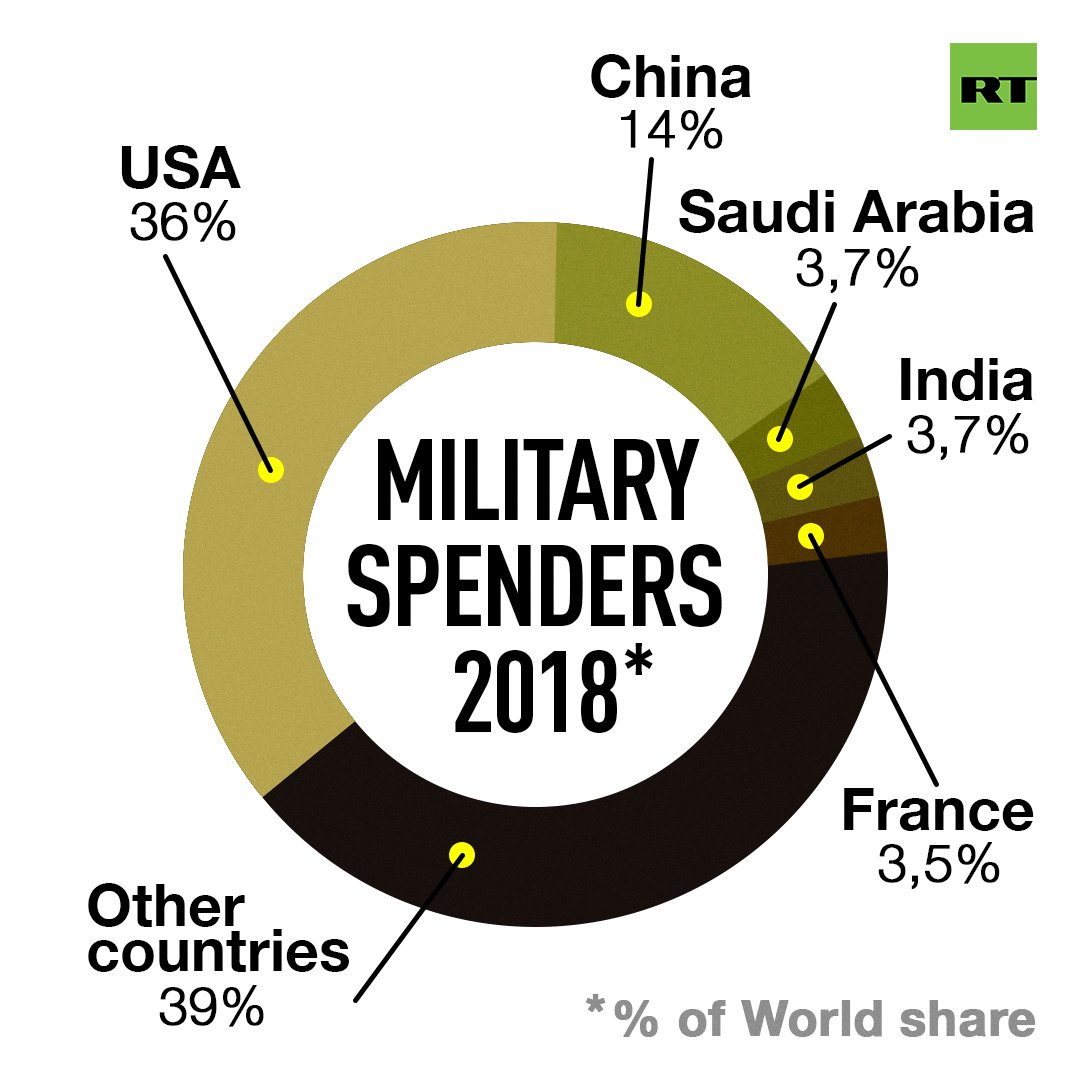Our planet is on the verge of an environmental catastrophe. Billions live in abject poverty; millions more go hungry for want of food or clean drinking water.
The gap between rich and poor grows and grows. The wealthiest 1 per cent of people on our planet could fit in a public-transport bus.
Yet today, while the world faces these huge challenges, spending on armed forces grows and grows. The most recent report on global military spending by the Stockholm International Peace Research Institute, World Military Spending, 1988–2018, makes for sobering reading.
“Total world military expenditure rose to $1,822 billion in 2018,” the report says, “representing an increase of 2.6 per cent from 2017.” It breaks down that figure to show that the five biggest spenders in 2018 were the United States, China, Saudi Arabia, India, and France, which together accounted for 60 per cent of global military spending.
The United States has a population of approximately 330 million, China 1,400 million, Saudi Arabia 34 million, India 1,300 million, and France 65 million.
The United States, France and Saudi Arabia have a combined population of 429 million. None of these countries are under any military threat, but they are certainly involved in a lot of military adventures around the globe, as well as arming and financing many terrorist groups.
India sees Pakistan as a threat, and the present government is made up of a Hindu extremist party. China is threatened with encirclement by the United States and its NATO allies.
The United States, which has approximately eight hundred military bases spread around the globe, has increased its military spending for the first time since 2010, by 4½ per cent, to reach $649 billion in 2018. This makes it the largest spender on armaments in the world, spending almost as much on its military in 2018 as the next eight countries combined. While China’s spending on its military grew for the twenty-fourth consecutive year, China has few if any military facilities outside its own borders.
Imperialist aggression is forcing more and more countries to divert scarce resources to military budgets, thereby forcing further cuts in social schemes. Small countries are forced, if they receive financial support from capitalist powers, to purchase goods and services as well as military weaponry from those countries.
The SIPRI report reveals that total global military spending rose for the second consecutive year in 2018, to the highest level since 1988 (the first year for which consistent global data is available). World spending is now 76 per cent higher than the low point of 1998, after the Cold War. World military spending in 2018 accounted for 2.1 per cent of global GDP, or $239 per person.
Other notable developments
- The largest absolute increase in spending in 2018 was by the United States ($28 billion).
- Total military expenditure in 2018 by all twenty-nine NATO members was $963 billion, accounting for 53 per cent of world spending.
- Military spending in South America rose by 3 per cent in 2018. This was mainly due to the increase of 5 per cent in Brazil’s spending, the second increase in as many years.
- Military spending in Turkey increased by 24 per cent in 2018, to $19 billion, the highest annual increase among the world’s fifteen biggest military spenders.
- Six of the ten countries with the highest military burden (military spending as a proportion of GDP) are in the Middle East: Saudi Arabia (8.8 per cent of GDP), Oman (8.2 per cent), Kuwait (5.1 per cent), Lebanon (5 per cent), Jordan (4.7 per cent), and Israel (4.3 per cent).
Spending on armed forces is a priority of the imperialist countries in their strategy of global domination and control of resources and territory. The needs of the people are far down the list of government priorities.
Wars, both large and small, are extremely damaging to the global environment. The impact of wars on the environment will last for many decades, rendering large tracts of land unfit for farming because of poisoning.
Here in Ireland the Government signed up to the EU’s “Permanent Structured Cooperation on Security and Defence” (PESCO), whereby it has committed itself to increase spending on the Defence Forces to keep in line with the military needs and strategies of the European Union. It will cost us all in the form of cuts in health, education, and housing.
Militarism affects everyone.






